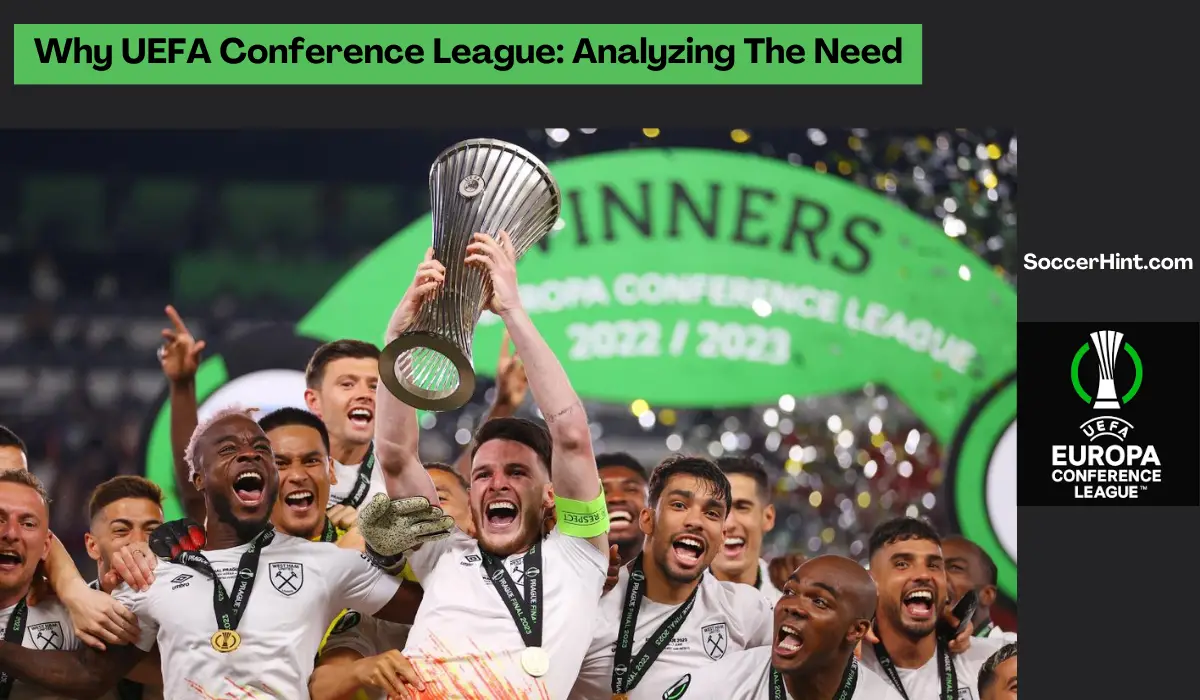In the world of European football, something new and exciting has emerged: the UEFA Conference League. You might wonder, with the Champions League and Europa League already in place, why create another tournament? This question becomes even more important as we think about why UEFA, the organization in charge of European football, decided to bring this new competition into the picture.
Think of it like this: we have the big and famous Champions League, and then the intense Europa League. Both are like the playgrounds of the best and strongest teams. So, why did UEFA decide to make room for a third competition? This is what we’re here to find out.
The UEFA Conference League is a chance for teams that might not be as famous or powerful to shine on the European stage. It’s a bit like giving them a spotlight they didn’t have before. But what pushed UEFA to think, “We need another league!”? That’s the question we’re digging into.
In this article, we’re going to figure out why UEFA thought up the Conference League. We want to understand the reasons that made them want this new tournament alongside the others. By doing this, we can learn why UEFA made this choice and what they hope the Conference League will bring to the world of European football.
So, let’s dive in and discover the story behind the UEFA Conference League, why it was made, and what makes it a special part of European club football.
7 Main Reasons Why UEFA Conference League Is Created
There are seven main reasons why UEFA Conference League is created and they are explained below in detail.
1. Broadened Inclusion
The core reason behind the creation of the UEFA Conference League is to ensure the broader inclusion of football clubs from various leagues across Europe. This initiative addresses a practical need within the football landscape. With the already established UEFA Champions League and Europa League primarily attracting the top-tier and mid-tier clubs, a gap existed for clubs that were not consistently part of these competitions due to their lower rankings.
The UEFA Conference League steps in to fill this gap. It acknowledges that football is not only about the elite teams but also about the diverse tapestry of clubs that contribute to the sport’s vibrancy. By providing an avenue for clubs that may not have the same financial or competitive resources as their more prominent counterparts, UEFA aims to create a level playing field that extends beyond the traditional powerhouses.
This broadened inclusion serves to give clubs from smaller leagues and regions an opportunity to taste the excitement of European competition. It’s a practical response to the question of “Why UEFA Conference League?” – designed to make European football more democratic and reflective of the wider football community. This approach aligns with UEFA’s goal of growing football culture across the continent, ensuring that the beautiful game resonates with diverse audiences and enables clubs of all sizes to share in the exhilaration of international football.
2. Enhanced Competitions
The creation of the UEFA Conference League is intricately tied to the goal of enhancing competition within European football. While the UEFA Champions League and Europa League already offer high-level competition, they often cater to clubs with greater financial strength and historical success. This scenario occasionally results in uneven matches during the early stages of those tournaments.
This is why we need to understand the importance of the UEFA Conference League. By accommodating clubs of similar strengths and standings, the tournament aims to foster more balanced and intense matches from the outset. This analytical approach acknowledges that football enthusiasts, regardless of team allegiances, seek competitive encounters that keep them engaged and excited.
The Conference League’s presence contributes to the overall football ecosystem by providing clubs with a platform to compete on equal footing. This not only ensures more closely contested matches but also encourages clubs to strive for improvement and success.
Furthermore, the enhanced competition within the UEFA Conference League contributes to the overall growth of European football by strengthening the skills of players, managers, and the tactical aspects of the game.
3. Youth Development
The inception of the UEFA Conference League plays a pivotal role in nurturing youth development within European football clubs. The tournament provides a practical avenue for younger and emerging players to gain valuable international experience, a crucial factor in their growth as professional athletes.
Consider the hypothetical case of a mid-tier football club from a smaller league. Traditionally, this club might not have had the chance to participate in top-tier European competitions due to its limited resources or lower ranking. However, with the introduction of the Conference League, this club now gains entry to a European tournament.
In this scenario, the club’s coaching staff sees an opportunity to field younger talents who may not have been ready for the intensity of the Champions League or Europa League. These players get the chance to play against opponents from different countries, adapting to varying styles of play and experiencing the pressures of international competition. This hands-on exposure is invaluable for their development, helping them mature as athletes and fostering their ability to perform under diverse circumstances.
The practical significance lies in how the UEFA Conference League bridges the gap between domestic and international football for these budding talents. While they continue to gain experience and develop in their domestic leagues, the tournament provides a controlled and competitive environment to refine their skills on a bigger stage. This translates to a more well-rounded, capable player who can contribute not only to their club’s success but also potentially to their national teams in the future.
Read Also: English Championship Prize Money Per Position
4. Financial Fairness
The creation of the UEFA Conference League is underpinned by the pursuit of financial fairness across European football clubs. This objective is particularly evident when examining the financial aspects of the tournament, and a practical example helps illustrate this point.
Consider a club from a smaller European league with limited financial resources. Historically, this club may have aspired to reach the UEFA Europa League, which offers substantial financial rewards. However, the competitive landscape often favoured clubs from wealthier leagues, making it challenging for smaller clubs to secure a spot in such tournaments.
Now, with the UEFA Conference League in the picture, the dynamics changed. Let’s say this smaller club successfully qualifies for the group stage of the Conference League. For participating in the group stage alone, the club is guaranteed a share of the prize money – let’s say, for example, €1 million. This is a significant boost for a club operating on a tighter budget.
As the tournament progresses, let’s assume the club reaches the knockout stages. With each advancement, they secure additional prize money. If they manage to reach the final stages, the monetary reward increases substantially. This financial support, while not on the same scale as the Champions League or Europa League, is substantial for clubs operating with smaller budgets.
By creating a financially rewarding competition that is accessible to a broader spectrum of clubs, the UEFA Conference League effectively addresses the disparity in financial resources among European teams. This practical approach ensures that clubs from less lucrative leagues can also benefit financially from their participation, promoting fairness and equitable distribution of funds. This financial boost, though not astronomical, can have a meaningful impact on club operations, player acquisitions, youth development, and overall stability.
Consider Reading: Premier League vs Champions League Prize Money
5. Diverse Pathways
The introduction of the UEFA Conference League stems from the intention to provide diverse pathways for football clubs to access European competitions. This approach ensures that clubs with varying strengths and histories have practical opportunities to participate in continental tournaments.
Imagine a club from a mid-tier European league. Historically, this club might have aspired to reach the prestigious UEFA Champions League or the competitive Europa League. However, the challenges of facing stronger opponents from bigger leagues often made this goal difficult to achieve. The dream of participating in a top-tier European tournament felt out of reach.
Now, with the UEFA Conference League, a new pathway opens up. Let’s say this mid-tier club puts up strong performances in their domestic league, securing a place in the Conference League qualifiers. Their journey begins. As they progress through the tournament’s stages, they face teams of similar standing, providing them with practical chances of advancing further.
Consider a scenario where this club makes it to the final stages of the Conference League. They face other clubs that have followed similar paths, creating a level playing field. As the competition progresses, the club’s players gain international experience, the team’s reputation improves, and their fans are treated to exciting European matches.
In this practical example, the UEFA Conference League presents a diverse pathway that aligns with the aspirations and capabilities of mid-tier clubs. It offers them a practical route to experience European competition without immediately competing against the juggernauts of the Champions League or the established forces of the Europa League. This approach opens doors for clubs that might have felt excluded from elite tournaments due to financial, competitive, or historical reasons.
6. Fan Engagement
Why UEFA Conference League? One compelling reason lies in the enhanced fan engagement it brings to the world of European football. The tournament taps into the enthusiasm of fans who support clubs that might not have been a part of other major European competitions before.
For many fans, the opportunity to watch their beloved team compete on an international stage is a dream come true. With the UEFA Conference League, this dream becomes a practical reality. Fans of clubs from diverse leagues and regions now have a reason to tune in, attend matches, and cheer for their teams on the European platform.
Let’s consider the case of a club that was previously overshadowed by more prominent teams in their domestic league. These fans may have remained loyal despite their club’s limited exposure. With the UEFA Conference League, their loyalty is rewarded with the chance to see their team represent them on the European scene.
These practical moments of connection between clubs and fans lead to increased engagement. Fans become more invested in following the journey of their team, creating an atmosphere of excitement and anticipation. Moreover, as fans from various clubs come together to support their teams, the overall fan experience is enriched.
7. Growing Fan Culture
The creation of the UEFA Conference League answers the question of why the UEFA Conference League by contributing to the growth of football culture across diverse regions. This initiative practically extends the reach of European football, making it more inclusive and accessible.
Consider a scenario where a club from a lesser-known league qualifies for the UEFA Conference League. Their journey begins, and their fans, who might not have had the chance to experience European competition, now have a reason to be excited. The club’s participation generates enthusiasm, not only among its local supporters but also among those who appreciate the underdog spirit.
This practical example highlights how the UEFA Conference League serves as a stepping stone for clubs to gain international recognition. As these clubs progress in the tournament, their stories of determination and passion capture the hearts of football enthusiasts from different corners of Europe. Fans rally behind these clubs, creating a vibrant and diverse football culture that goes beyond traditional powerhouses.
The UEFA Conference League’s practical impact on growing football culture lies in its ability to introduce new narratives, heroes, and journeys. It brings fresh stories to the forefront and expands the tapestry of European football. This, in turn, fosters a more inclusive and dynamic football community, where clubs from various backgrounds contribute to the rich narrative of the sport.
Final Thought
The UEFA Conference League emerges as a beacon of change in the realm of European football, and one vital reason for its creation stands out above the rest: broadened inclusion. This reason echoes loudly as a testament to the tournament’s significance, not only for European football enthusiasts but also for the lower-tier clubs striving to make their mark on the international stage.
The beauty of the UEFA Conference League lies in its ability to practically address the needs of clubs that previously found European competitions elusive. It provides a tangible platform for these clubs to compete, bringing them into the spotlight and kindling the passion of their fans. This newfound avenue for participation enriches football culture by introducing diverse narratives, heroes, and journeys that resonate deeply with fans from all walks of life.
The UEFA Conference League’s thoughtful creation is a resounding message that football is not just for the elite; it’s for the entire spectrum of clubs that make up the rich tapestry of European football. The tournament’s success demonstrates that the football world values inclusivity, competitiveness, and the dreams of clubs that might not have garnered the limelight before.
As we celebrate the UEFA Conference League’s positive impact, we hold hope that this innovative approach to football competitions will inspire others around the globe, like CONCACAF and other continental bodies, to follow suit. The transformational power of broadened inclusion, as exemplified by the UEFA Conference League, can be a driving force in enhancing football experiences for fans and lower-tier clubs worldwide.
In embracing this refreshing approach, we champion football’s roots, its global appeal, and the dreams of countless clubs aspiring to share in the magic of international competition. The UEFA Conference League has proven that the world’s beautiful game is for everyone, and it beckons us all to revel in the unity and diversity it fosters, both on and off the pitch.





